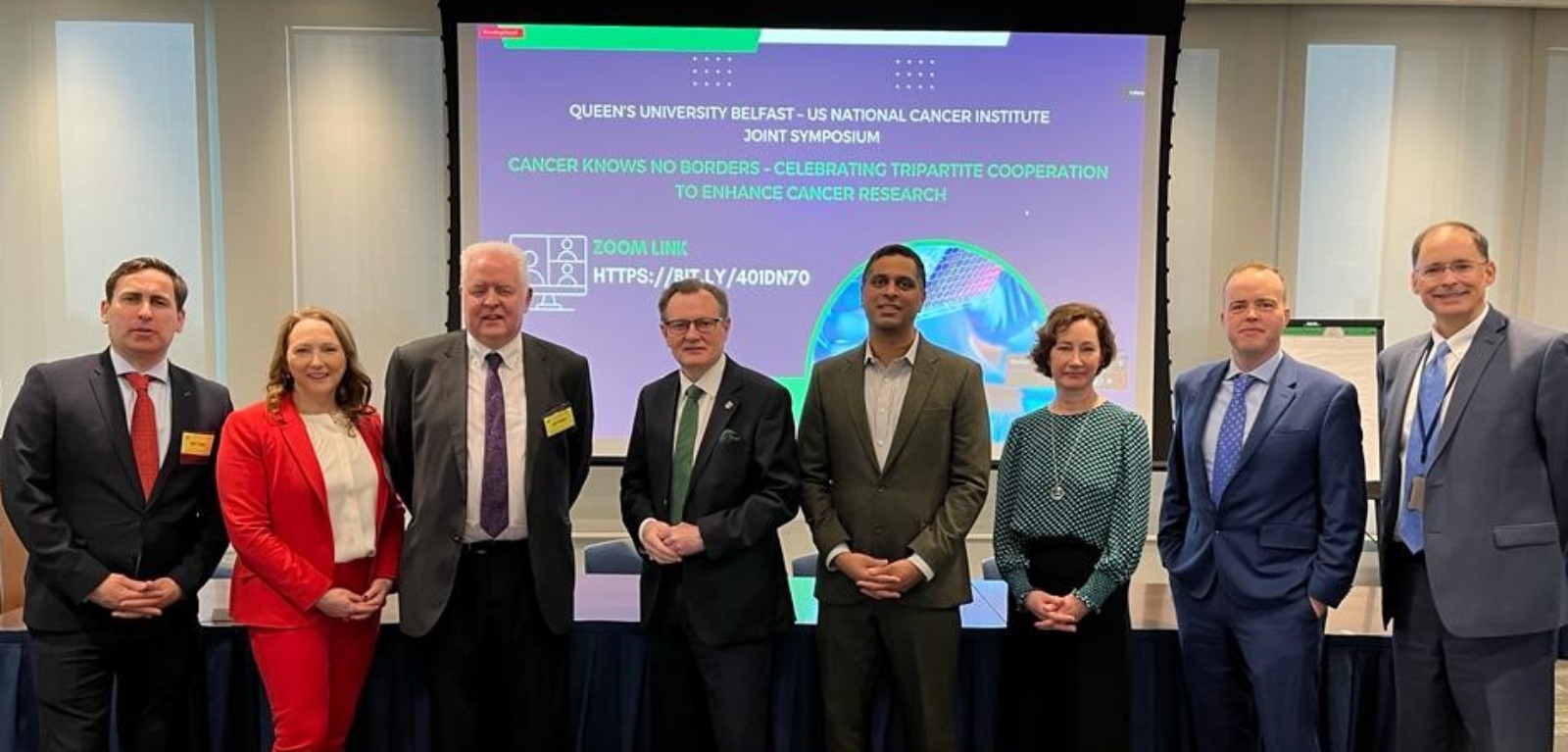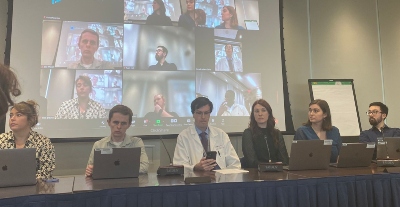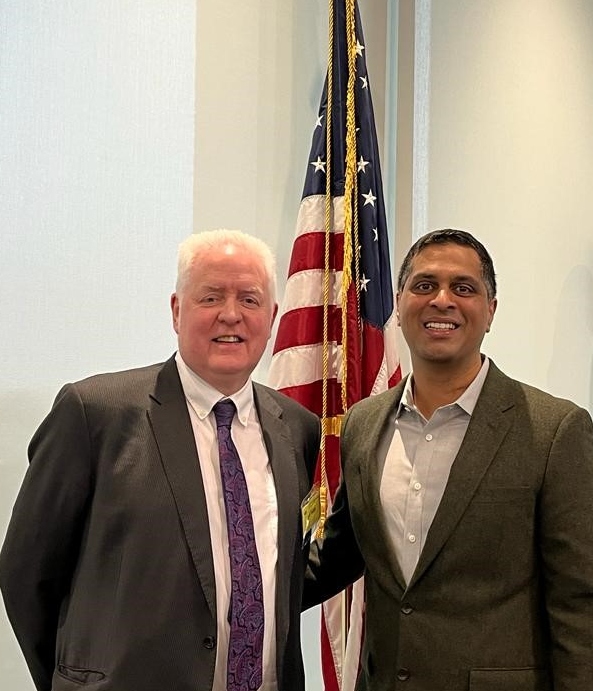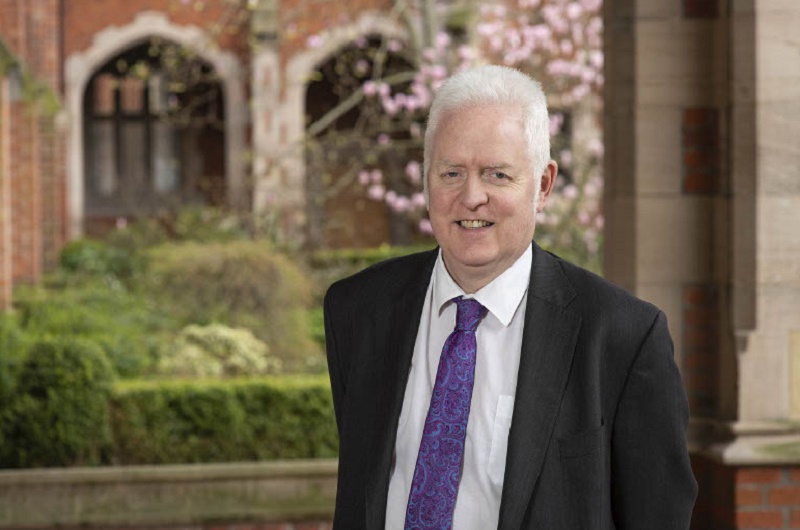Queen’s-US symposium celebrates cross-border and transatlantic collaboration in cancer research
Queen’s University Belfast and the US National Cancer Institute (NCI) hosted a joint symposium event today entitled “Cancer Knows No Borders – Celebrating Tripartite Cooperation to Enhance Cancer Research”.

(L-R) Ciaran Briscoe, North Eastern Cancer Research and Education Trust and All-Island Cancer Research Institute (AICRI); Eibhlin Mulroe, CEO Cancer Trials Ireland and AICRI; Professor Mark Lawler, Queen's University Belfast and Co-Lead AICRI; Professor Ian Greer, President and Vice-Chancellor of Queen's University Belfast; Dr Satish Gopal, Director, Centre for Global Health, National Cancer Institute (NCI); Dr Mairead O’Driscoll, CEO Health Research Board of Ireland; Professor Liam Gallagher, Professor of Cancer Biology, University College Dublin and Co-Lead AICRI; and Dr James Gulley, Deputy Director, Centre for Cancer Research, NCI at the Symposium.
The significant hybrid event took place at the NCI in Bethesda, Washington. It coincided with St. Patrick’s Week and the 25th Anniversary of the Belfast/Good Friday Agreement.
The symposium highlighted one of the lesser-known achievements of the Good Friday Agreement, the success that has been achieved through the Ireland - Northern Ireland - National Cancer Institute Cancer Consortium, established in 1999, between the governments of Ireland, Northern Ireland and the US, following the Belfast/Good Friday Agreement.
The ambitious aim at the time was “‘to reduce cancer incidence and mortality on the island of Ireland through cross-border and transatlantic collaborations in cancer research and education”. Since then, collaborative cancer research on the island of Ireland has doubled, with increasing publication in highly regarded scientific and medical journals.
Over 30,000 cancer patients have been enrolled in clinical trials during the period, gaining access to the latest therapies, with thousands of lives saved as a result. Outcomes for breast cancer in Northern Ireland went from being the worst in the UK, to the best in the UK, in less than two decades. Similar improvements in oesophageal cancer outcomes on both sides of the border testify to the advantages of working together across borders.
Commenting on Queen’s important role within the consortium as he opened the Symposium, Professor Ian Greer, President and Vice-Chancellor of Queen’s University Belfast, said: “This is a very special day for Queen’s and the leadership role it has played in cancer research and its translation to better care on the island of Ireland.
“I am delighted to be here at the world-renowned National Cancer Institute in Washington to celebrate this success, particularly in the year that we recognise the many achievements of the Belfast/Good Friday Agreement.”
The event also celebrates the prestigious joint Queen’s/NCI Doctoral Training Programme in Precision Cancer Medicine, which began in 2019, and is supported through the Health and Social Care Research and Development Office in Northern Ireland, Queen’s and the NCI.
Seven Queen’s PhD students on the programme presented their groundbreaking cancer research in areas such as pancreatic genetics, prostate cancer resistance to treatment, and the use of health data in cancer research.
Speaking on the importance of the event, Professor Mark Lawler, Professor of Digital Health, and Chair in Translational Cancer Genomics at Queen’s University and the convenor of the symposium, said: "I am immensely proud to be here at the NCI in Washington, as our students present their world class research. The quality of the research is undeniable and our students have won twelve prestigious awards, and have published papers in high quality scientific journals, testifying both to their outstanding talent and the quality of the training programme.”

Award-winning Queen's students participate in the Q&A session at the Symposium
One of the award-winning students, from Queen’s University, Bega Murray said: “I have had the unrivalled opportunity to work in one of the best cancer research institutes in the world, performing cutting edge research with a wide range of state-of-the-art technologies. This has been a wonderful experience for me at this stage in my career.”
Course Director, Dr Nick Orr, Reader in Cancer Genomics at the Patrick G Johnston Centre for Cancer Research at Queen’s University, added: “This programme has not only led to high quality training for our students; it has also given rise to significant cancer research collaborations between Northern Ireland and the US, leading to research with greater impact."
Attendees, in person and online, also heard about the significant advances that have been made by the All-Island Cancer Research Institute (AICRI) and the work of Cancer Trials Ireland.

Professor Mark Lawler from Queen's University and Dr Satish Gopal, Director, Centre for Global Health, National Cancer Institute at the Symposium
Professor Lawler added: “This is a truly memorable day for both Queen’s University Belfast and the island of Ireland. The quality of our students is truly remarkable and their work has led to significant research grant success, with over €300,000 to date being secured by Queen’s researchers. We are now at the top table in global cancer research and the quality of the work that our young people are doing is making the cancer research community worldwide sit up and take notice.”
The event “Cancer Knows No Borders – Celebrating Tripartite Cooperation to Enhance Cancer Research” can be viewed here via Webcast.
Further information on this groundbreaking work can be found here.
Featured Expert

Media
Media inquiries to Sian Devlin at s.devlin@qub.ac.uk